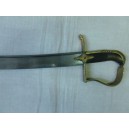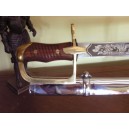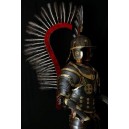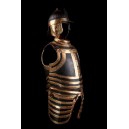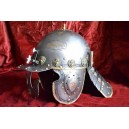No products
Polish Swords
- Legendary Swords
- Samurai Swords
- Cold Steel Katana Swords
- SkyJiro Forge Katana Swords
- Thaitsuki Swords
- Citadel Katana Swords
- Dragon King Samurai Swords
- YariNoHanzo Katana Swords
- Imperial Forge Katana Swords
- Musashi Katana Swords
- Cheap Samurai Swords
- Katanas
- Military Gunto
- Shirasaya
- Tachi
- Wakizashi
- Tanto
- Sword Sets
- Weapons
- Custom Katana Swords
- Kaneie Samurai Swords
- Samurai Armor
- Sword Deals
- Battle Ready Swords
- Damascus Swords
- Celtic Swords
- Chinese Swords
- Civil War Weapons
- Conan Swords
- Fantasy Daggers
- Fantasy Swords
- Fencing Sword
- Military Swords
- French Napoleonic Saber Swords
- British Swords and Sabers
- German Swords
- Czech swords
- Polish Swords
- Russian Swords and Sabres
- Greek Swords
- Arabic swords
- Kit Rae Swords
- Knights Templar
- Knives
- LARP Swords
- Limited Edition Swords
- Masonic Swords
- Medieval Armor
- Medieval Costumes
- Medieval Daggers
- Medieval Swords
- Medieval Weapons
- Miniature Swords
- Movie Swords
- Lord of The Rings
- Hobbit Replicas
- Game of Thrones
- Highlander
- Vikings Weapons
- Walking Dead Swords
- Alexander Swords
- 300
- Assassin's Creed
- Braveheart
- Eragon Swords
- Excalibur
- Gladiator Swords
- Hercules Swords
- Xena Swords
- Kill Bill Swords
- Peter Pan Swords
- Rambo Knives
- Robin Hood Swords
- The Last Samurai
- Zorro Swords
- Terminator
- Princess Bride
- Zombie Weapons
- 47 Ronin Swords
- Expendables
- Predators
- Alien Weapons
- Immortals
- Snow White And The Huntsman
- Ninja Swords
- Pirate Swords
- Practice Swords
- Rapiers
- Roman and Greek Armor
- Roman Swords
- Sabres
- Scimitar Swords
- Spears and Lances
- Special Medieval Stuff
- Sword Display Stands
- Sword Letter Openers
- Swords of Justice
- Viking Swords
- Walking Canes
- Warriors
- Western Gun Knives
- Wooden Swords
- Replica Guns
- Ranged Weapons
- Antique Swords
- Damascene jewelry
- Film Cells
- Fantasy Prints
Karabela w Scabbard-Polish Sabre-Szabla Polska
GR1832
New product
Karabela w Scabbard-Polish Sabre-Szabla Polska. Nobility sabre 17th century. Exact reproduction of the original historical Polish sabre. Toledan steel, wood and leather scabard.
Ships in 14-21 days
More info
Karabela Sabre with Scabbard
Highly decorative Polish sabre (Szabla) of the 17th century.
Karabela sabre features
Sabre length 99 cm
Sabre weight: 1.7 kg
This model is made of high carbon steel Toledan. Sabre is not sharpened or adapted for sharpening.
Both sides of the blade are smooth (suitable for engraving)
The scabbard is made of wood and leather (with brass ornaments). In the vagina there are motifs of the Virgin Mary and Polish Eagle
The handle is made of steel and wood with brass elements.
Karabela sabre history
Karabela was a light and often decorative saber Polish nobility open the guard and handle pattern formed on the head of an eagle. Well proven in combat on foot, so often worn with everyday attire and, therefore, usually richly decorated. Sabre was characteristic of Sarmatian - Polish artistic culture of the second half of the seventeenth and eighteenth centuries. The weapon came from Turkey, but as a result of centuries of use by the Polish nobility gained local character.
Often cites several theories on the origin of the name saber Karabela:
The first is that the name is derived from the combination of two words from the language of the Turkish "Kara" - meaning black and Arab "Bela" which means misfortune, a curse or a curse. The combination of these two words in the name Karabela a total word meaning "black curse", "black misery" or "black curse".
In parallel, there is also a version of the Italian or Latin origin of the name. The name would come from the words "cara" (precious) and "bella" (beautiful),
According to the theory of Polish prowiniencji name would be derived from the name of a Polish nobleman - Karabeli, who allegedly introduced the first lightweight, decorative sword as a complement to court costume parade. What justification is the Polish tradition of naming orężu of names such as batorówka, Zygmuntowka, Augustówka or Kosciuszko,
Another theory derives the name of the sword of geographical names in Turkey, Iraq, or Iran, where the name of the sabers produce. Most often we here the Iraqi town Kerbel (by Zygmunt Gloger ), but also points to other related Iraqi-Persian cultural circle.
Very likely version is that the name derives from the indosłowiańskiego prasłowa, which corresponds to the Sanskrit word "karavala", meaning sword or scimitar. "






